Reflection on my own attitude and impact on Aboriginal and Torres Strait Islander on my nursing practices
VerifiedAdded on 2023/06/05
|8
|2002
|205
AI Summary
This reflective essay depicts my learning assessment of contemporary Indigenous persons among Australians. The task, reports the experiences i learnt from my practicum and appreciating the role of diverse people and engaging in understanding and appreciating divergent cultures. Undertaking the three tasks above, it has given me an opportunity to be better equipped me in understanding and learning better from my colleagues. Respect for diversity and learning more from the diverse culture and different personalities play a crucial role to me during my practice.
Contribute Materials
Your contribution can guide someone’s learning journey. Share your
documents today.
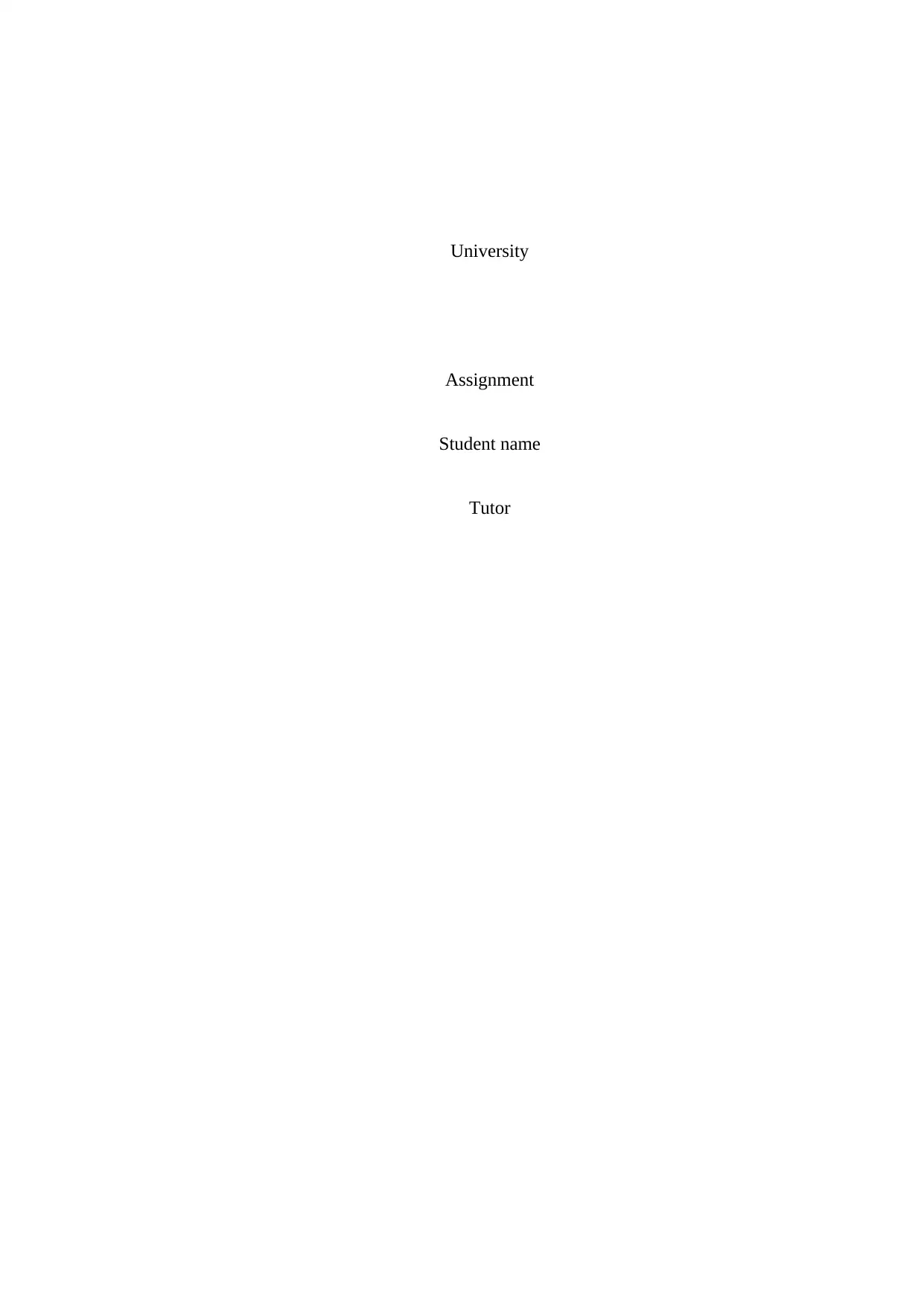
University
Assignment
Student name
Tutor
Assignment
Student name
Tutor
Secure Best Marks with AI Grader
Need help grading? Try our AI Grader for instant feedback on your assignments.
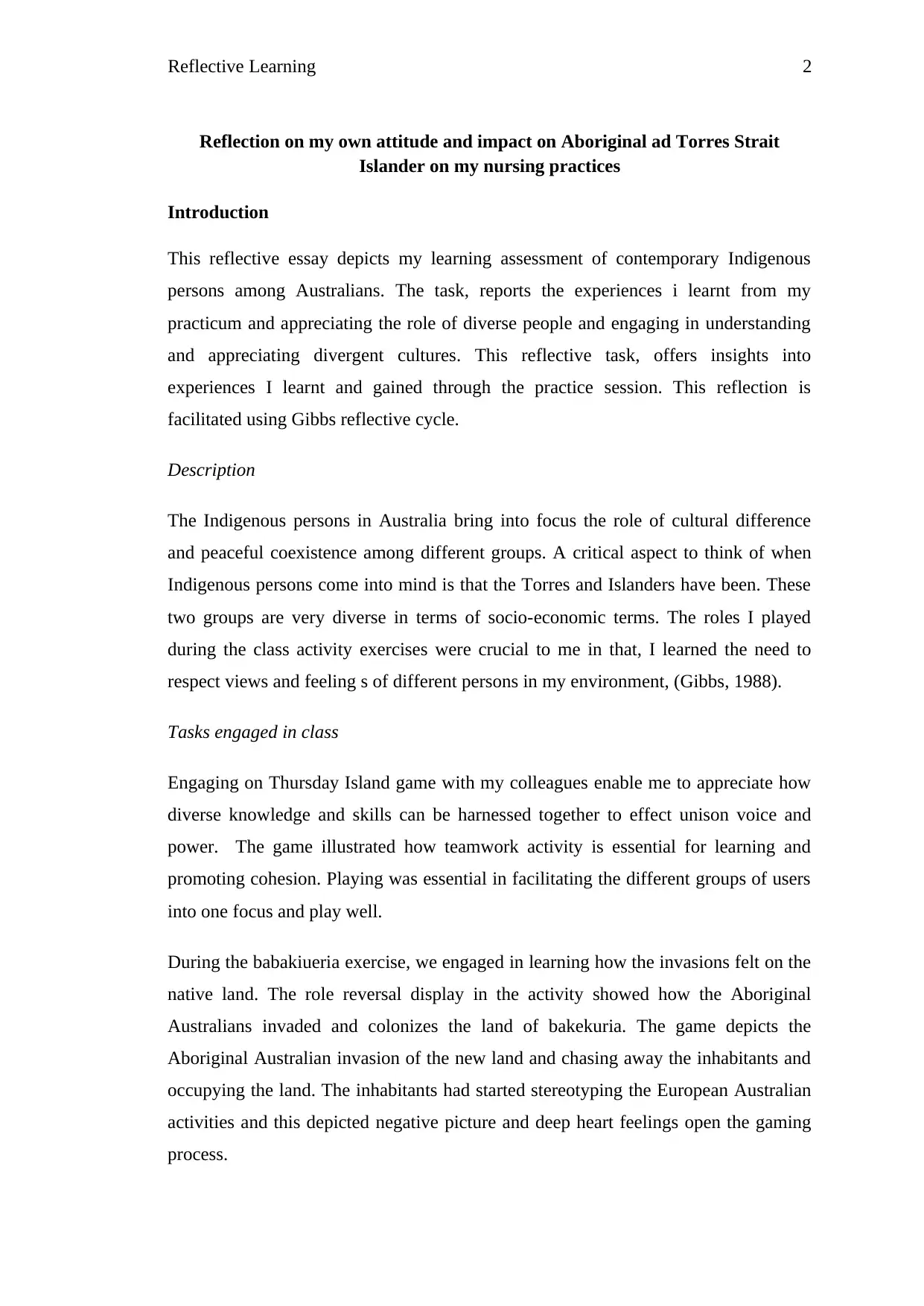
Reflective Learning 2
Reflection on my own attitude and impact on Aboriginal ad Torres Strait
Islander on my nursing practices
Introduction
This reflective essay depicts my learning assessment of contemporary Indigenous
persons among Australians. The task, reports the experiences i learnt from my
practicum and appreciating the role of diverse people and engaging in understanding
and appreciating divergent cultures. This reflective task, offers insights into
experiences I learnt and gained through the practice session. This reflection is
facilitated using Gibbs reflective cycle.
Description
The Indigenous persons in Australia bring into focus the role of cultural difference
and peaceful coexistence among different groups. A critical aspect to think of when
Indigenous persons come into mind is that the Torres and Islanders have been. These
two groups are very diverse in terms of socio-economic terms. The roles I played
during the class activity exercises were crucial to me in that, I learned the need to
respect views and feeling s of different persons in my environment, (Gibbs, 1988).
Tasks engaged in class
Engaging on Thursday Island game with my colleagues enable me to appreciate how
diverse knowledge and skills can be harnessed together to effect unison voice and
power. The game illustrated how teamwork activity is essential for learning and
promoting cohesion. Playing was essential in facilitating the different groups of users
into one focus and play well.
During the babakiueria exercise, we engaged in learning how the invasions felt on the
native land. The role reversal display in the activity showed how the Aboriginal
Australians invaded and colonizes the land of bakekuria. The game depicts the
Aboriginal Australian invasion of the new land and chasing away the inhabitants and
occupying the land. The inhabitants had started stereotyping the European Australian
activities and this depicted negative picture and deep heart feelings open the gaming
process.
Reflection on my own attitude and impact on Aboriginal ad Torres Strait
Islander on my nursing practices
Introduction
This reflective essay depicts my learning assessment of contemporary Indigenous
persons among Australians. The task, reports the experiences i learnt from my
practicum and appreciating the role of diverse people and engaging in understanding
and appreciating divergent cultures. This reflective task, offers insights into
experiences I learnt and gained through the practice session. This reflection is
facilitated using Gibbs reflective cycle.
Description
The Indigenous persons in Australia bring into focus the role of cultural difference
and peaceful coexistence among different groups. A critical aspect to think of when
Indigenous persons come into mind is that the Torres and Islanders have been. These
two groups are very diverse in terms of socio-economic terms. The roles I played
during the class activity exercises were crucial to me in that, I learned the need to
respect views and feeling s of different persons in my environment, (Gibbs, 1988).
Tasks engaged in class
Engaging on Thursday Island game with my colleagues enable me to appreciate how
diverse knowledge and skills can be harnessed together to effect unison voice and
power. The game illustrated how teamwork activity is essential for learning and
promoting cohesion. Playing was essential in facilitating the different groups of users
into one focus and play well.
During the babakiueria exercise, we engaged in learning how the invasions felt on the
native land. The role reversal display in the activity showed how the Aboriginal
Australians invaded and colonizes the land of bakekuria. The game depicts the
Aboriginal Australian invasion of the new land and chasing away the inhabitants and
occupying the land. The inhabitants had started stereotyping the European Australian
activities and this depicted negative picture and deep heart feelings open the gaming
process.
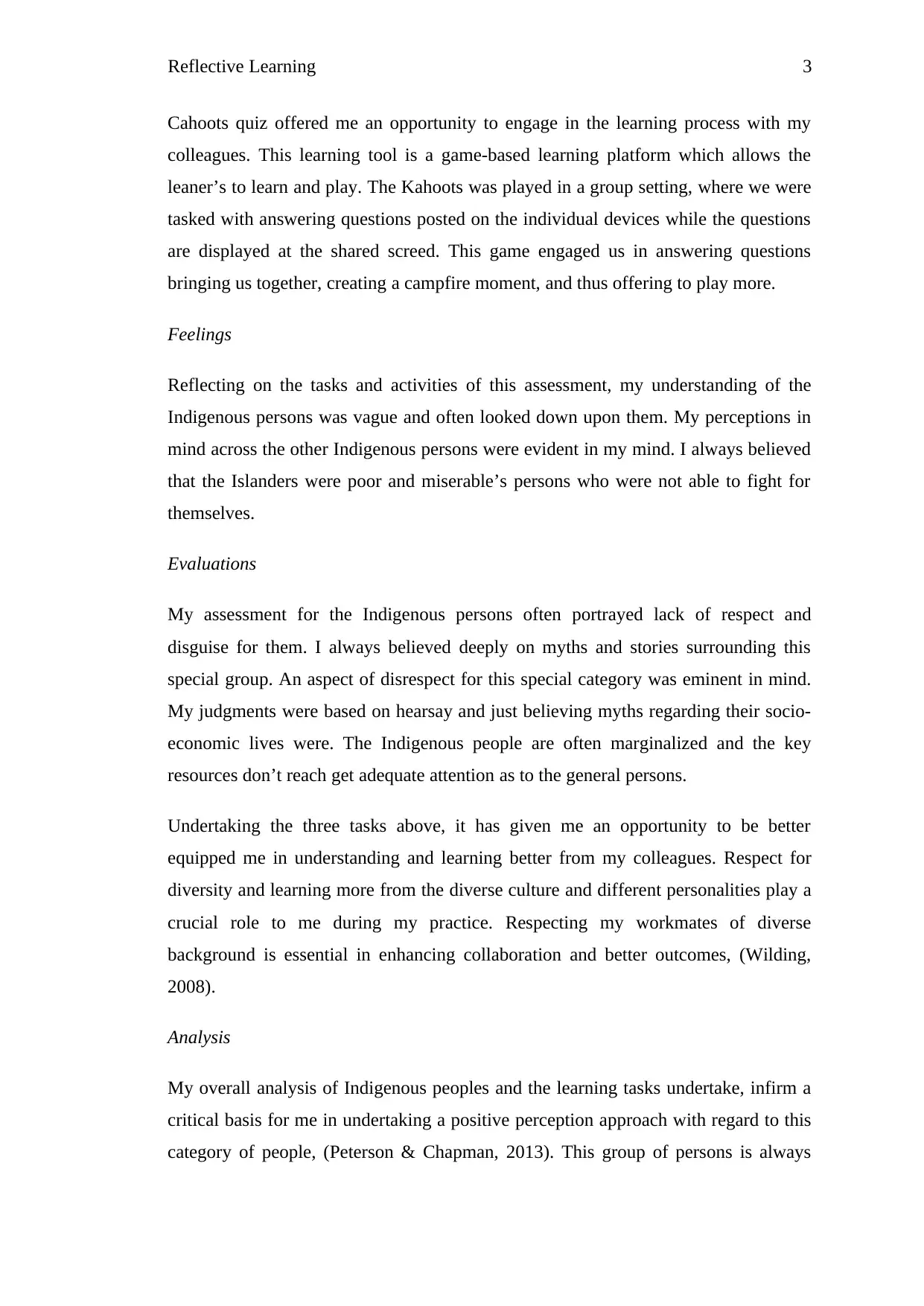
Reflective Learning 3
Cahoots quiz offered me an opportunity to engage in the learning process with my
colleagues. This learning tool is a game-based learning platform which allows the
leaner’s to learn and play. The Kahoots was played in a group setting, where we were
tasked with answering questions posted on the individual devices while the questions
are displayed at the shared screed. This game engaged us in answering questions
bringing us together, creating a campfire moment, and thus offering to play more.
Feelings
Reflecting on the tasks and activities of this assessment, my understanding of the
Indigenous persons was vague and often looked down upon them. My perceptions in
mind across the other Indigenous persons were evident in my mind. I always believed
that the Islanders were poor and miserable’s persons who were not able to fight for
themselves.
Evaluations
My assessment for the Indigenous persons often portrayed lack of respect and
disguise for them. I always believed deeply on myths and stories surrounding this
special group. An aspect of disrespect for this special category was eminent in mind.
My judgments were based on hearsay and just believing myths regarding their socio-
economic lives were. The Indigenous people are often marginalized and the key
resources don’t reach get adequate attention as to the general persons.
Undertaking the three tasks above, it has given me an opportunity to be better
equipped me in understanding and learning better from my colleagues. Respect for
diversity and learning more from the diverse culture and different personalities play a
crucial role to me during my practice. Respecting my workmates of diverse
background is essential in enhancing collaboration and better outcomes, (Wilding,
2008).
Analysis
My overall analysis of Indigenous peoples and the learning tasks undertake, infirm a
critical basis for me in undertaking a positive perception approach with regard to this
category of people, (Peterson & Chapman, 2013). This group of persons is always
Cahoots quiz offered me an opportunity to engage in the learning process with my
colleagues. This learning tool is a game-based learning platform which allows the
leaner’s to learn and play. The Kahoots was played in a group setting, where we were
tasked with answering questions posted on the individual devices while the questions
are displayed at the shared screed. This game engaged us in answering questions
bringing us together, creating a campfire moment, and thus offering to play more.
Feelings
Reflecting on the tasks and activities of this assessment, my understanding of the
Indigenous persons was vague and often looked down upon them. My perceptions in
mind across the other Indigenous persons were evident in my mind. I always believed
that the Islanders were poor and miserable’s persons who were not able to fight for
themselves.
Evaluations
My assessment for the Indigenous persons often portrayed lack of respect and
disguise for them. I always believed deeply on myths and stories surrounding this
special group. An aspect of disrespect for this special category was eminent in mind.
My judgments were based on hearsay and just believing myths regarding their socio-
economic lives were. The Indigenous people are often marginalized and the key
resources don’t reach get adequate attention as to the general persons.
Undertaking the three tasks above, it has given me an opportunity to be better
equipped me in understanding and learning better from my colleagues. Respect for
diversity and learning more from the diverse culture and different personalities play a
crucial role to me during my practice. Respecting my workmates of diverse
background is essential in enhancing collaboration and better outcomes, (Wilding,
2008).
Analysis
My overall analysis of Indigenous peoples and the learning tasks undertake, infirm a
critical basis for me in undertaking a positive perception approach with regard to this
category of people, (Peterson & Chapman, 2013). This group of persons is always
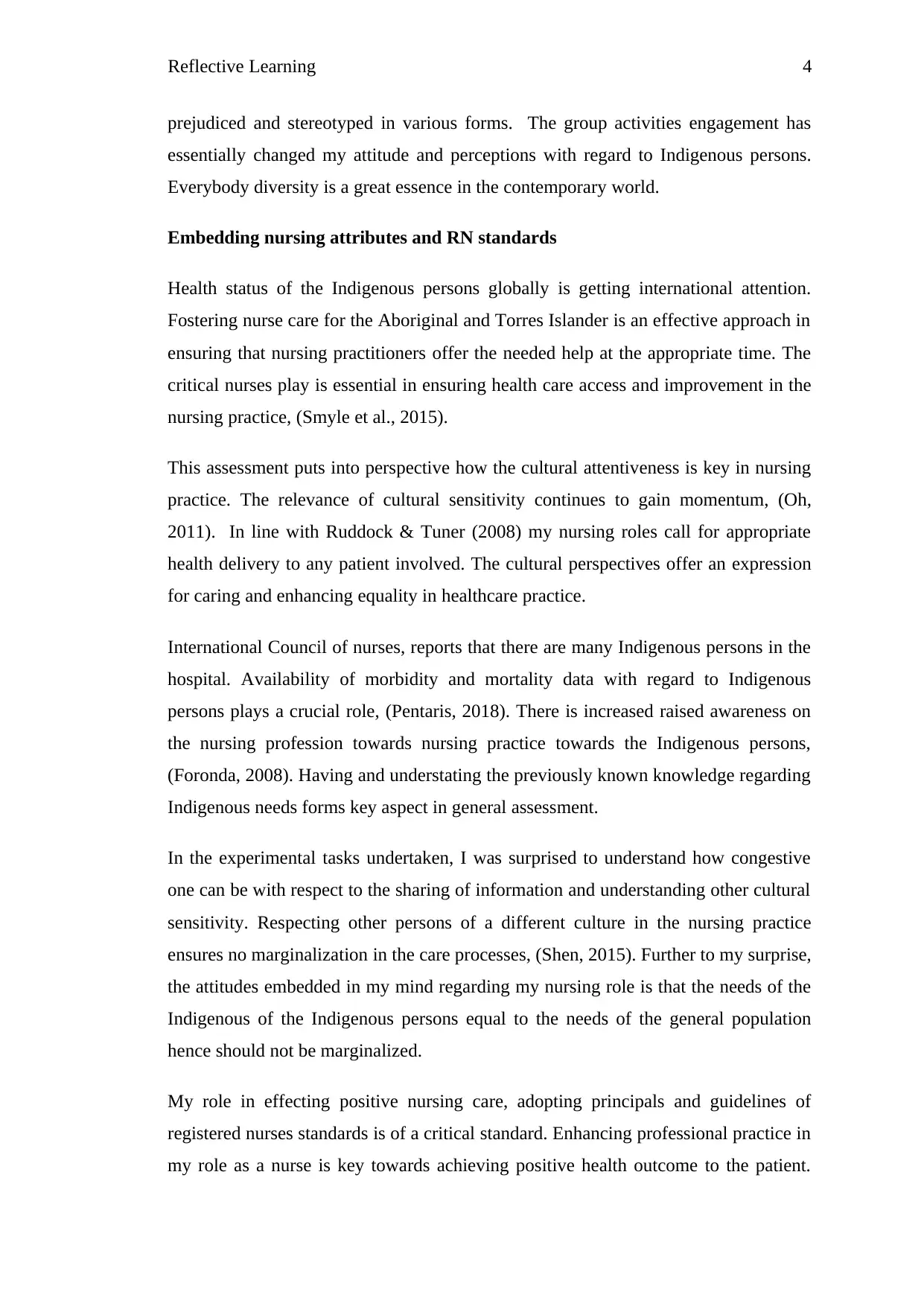
Reflective Learning 4
prejudiced and stereotyped in various forms. The group activities engagement has
essentially changed my attitude and perceptions with regard to Indigenous persons.
Everybody diversity is a great essence in the contemporary world.
Embedding nursing attributes and RN standards
Health status of the Indigenous persons globally is getting international attention.
Fostering nurse care for the Aboriginal and Torres Islander is an effective approach in
ensuring that nursing practitioners offer the needed help at the appropriate time. The
critical nurses play is essential in ensuring health care access and improvement in the
nursing practice, (Smyle et al., 2015).
This assessment puts into perspective how the cultural attentiveness is key in nursing
practice. The relevance of cultural sensitivity continues to gain momentum, (Oh,
2011). In line with Ruddock & Tuner (2008) my nursing roles call for appropriate
health delivery to any patient involved. The cultural perspectives offer an expression
for caring and enhancing equality in healthcare practice.
International Council of nurses, reports that there are many Indigenous persons in the
hospital. Availability of morbidity and mortality data with regard to Indigenous
persons plays a crucial role, (Pentaris, 2018). There is increased raised awareness on
the nursing profession towards nursing practice towards the Indigenous persons,
(Foronda, 2008). Having and understating the previously known knowledge regarding
Indigenous needs forms key aspect in general assessment.
In the experimental tasks undertaken, I was surprised to understand how congestive
one can be with respect to the sharing of information and understanding other cultural
sensitivity. Respecting other persons of a different culture in the nursing practice
ensures no marginalization in the care processes, (Shen, 2015). Further to my surprise,
the attitudes embedded in my mind regarding my nursing role is that the needs of the
Indigenous of the Indigenous persons equal to the needs of the general population
hence should not be marginalized.
My role in effecting positive nursing care, adopting principals and guidelines of
registered nurses standards is of a critical standard. Enhancing professional practice in
my role as a nurse is key towards achieving positive health outcome to the patient.
prejudiced and stereotyped in various forms. The group activities engagement has
essentially changed my attitude and perceptions with regard to Indigenous persons.
Everybody diversity is a great essence in the contemporary world.
Embedding nursing attributes and RN standards
Health status of the Indigenous persons globally is getting international attention.
Fostering nurse care for the Aboriginal and Torres Islander is an effective approach in
ensuring that nursing practitioners offer the needed help at the appropriate time. The
critical nurses play is essential in ensuring health care access and improvement in the
nursing practice, (Smyle et al., 2015).
This assessment puts into perspective how the cultural attentiveness is key in nursing
practice. The relevance of cultural sensitivity continues to gain momentum, (Oh,
2011). In line with Ruddock & Tuner (2008) my nursing roles call for appropriate
health delivery to any patient involved. The cultural perspectives offer an expression
for caring and enhancing equality in healthcare practice.
International Council of nurses, reports that there are many Indigenous persons in the
hospital. Availability of morbidity and mortality data with regard to Indigenous
persons plays a crucial role, (Pentaris, 2018). There is increased raised awareness on
the nursing profession towards nursing practice towards the Indigenous persons,
(Foronda, 2008). Having and understating the previously known knowledge regarding
Indigenous needs forms key aspect in general assessment.
In the experimental tasks undertaken, I was surprised to understand how congestive
one can be with respect to the sharing of information and understanding other cultural
sensitivity. Respecting other persons of a different culture in the nursing practice
ensures no marginalization in the care processes, (Shen, 2015). Further to my surprise,
the attitudes embedded in my mind regarding my nursing role is that the needs of the
Indigenous of the Indigenous persons equal to the needs of the general population
hence should not be marginalized.
My role in effecting positive nursing care, adopting principals and guidelines of
registered nurses standards is of a critical standard. Enhancing professional practice in
my role as a nurse is key towards achieving positive health outcome to the patient.
Secure Best Marks with AI Grader
Need help grading? Try our AI Grader for instant feedback on your assignments.
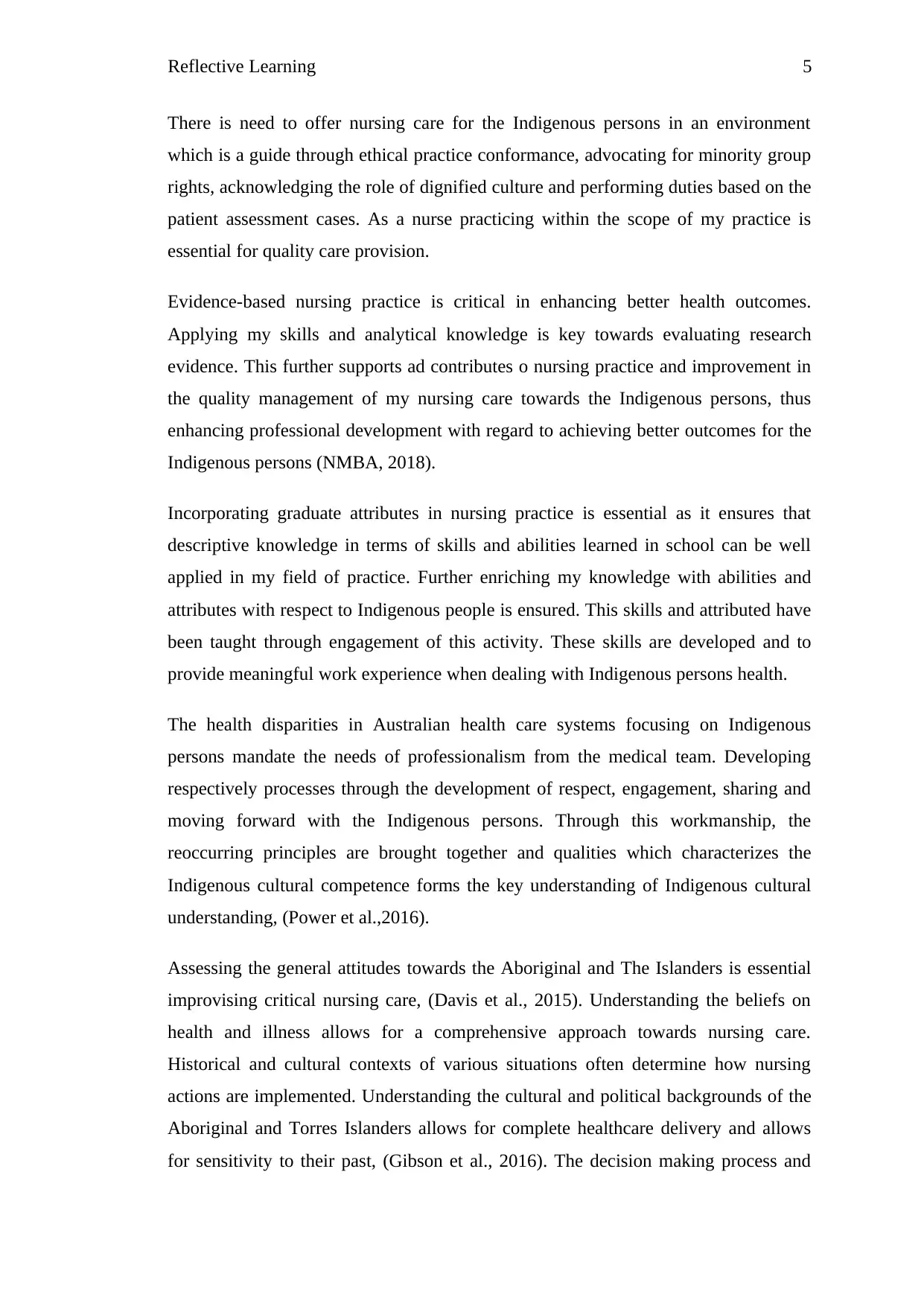
Reflective Learning 5
There is need to offer nursing care for the Indigenous persons in an environment
which is a guide through ethical practice conformance, advocating for minority group
rights, acknowledging the role of dignified culture and performing duties based on the
patient assessment cases. As a nurse practicing within the scope of my practice is
essential for quality care provision.
Evidence-based nursing practice is critical in enhancing better health outcomes.
Applying my skills and analytical knowledge is key towards evaluating research
evidence. This further supports ad contributes o nursing practice and improvement in
the quality management of my nursing care towards the Indigenous persons, thus
enhancing professional development with regard to achieving better outcomes for the
Indigenous persons (NMBA, 2018).
Incorporating graduate attributes in nursing practice is essential as it ensures that
descriptive knowledge in terms of skills and abilities learned in school can be well
applied in my field of practice. Further enriching my knowledge with abilities and
attributes with respect to Indigenous people is ensured. This skills and attributed have
been taught through engagement of this activity. These skills are developed and to
provide meaningful work experience when dealing with Indigenous persons health.
The health disparities in Australian health care systems focusing on Indigenous
persons mandate the needs of professionalism from the medical team. Developing
respectively processes through the development of respect, engagement, sharing and
moving forward with the Indigenous persons. Through this workmanship, the
reoccurring principles are brought together and qualities which characterizes the
Indigenous cultural competence forms the key understanding of Indigenous cultural
understanding, (Power et al.,2016).
Assessing the general attitudes towards the Aboriginal and The Islanders is essential
improvising critical nursing care, (Davis et al., 2015). Understanding the beliefs on
health and illness allows for a comprehensive approach towards nursing care.
Historical and cultural contexts of various situations often determine how nursing
actions are implemented. Understanding the cultural and political backgrounds of the
Aboriginal and Torres Islanders allows for complete healthcare delivery and allows
for sensitivity to their past, (Gibson et al., 2016). The decision making process and
There is need to offer nursing care for the Indigenous persons in an environment
which is a guide through ethical practice conformance, advocating for minority group
rights, acknowledging the role of dignified culture and performing duties based on the
patient assessment cases. As a nurse practicing within the scope of my practice is
essential for quality care provision.
Evidence-based nursing practice is critical in enhancing better health outcomes.
Applying my skills and analytical knowledge is key towards evaluating research
evidence. This further supports ad contributes o nursing practice and improvement in
the quality management of my nursing care towards the Indigenous persons, thus
enhancing professional development with regard to achieving better outcomes for the
Indigenous persons (NMBA, 2018).
Incorporating graduate attributes in nursing practice is essential as it ensures that
descriptive knowledge in terms of skills and abilities learned in school can be well
applied in my field of practice. Further enriching my knowledge with abilities and
attributes with respect to Indigenous people is ensured. This skills and attributed have
been taught through engagement of this activity. These skills are developed and to
provide meaningful work experience when dealing with Indigenous persons health.
The health disparities in Australian health care systems focusing on Indigenous
persons mandate the needs of professionalism from the medical team. Developing
respectively processes through the development of respect, engagement, sharing and
moving forward with the Indigenous persons. Through this workmanship, the
reoccurring principles are brought together and qualities which characterizes the
Indigenous cultural competence forms the key understanding of Indigenous cultural
understanding, (Power et al.,2016).
Assessing the general attitudes towards the Aboriginal and The Islanders is essential
improvising critical nursing care, (Davis et al., 2015). Understanding the beliefs on
health and illness allows for a comprehensive approach towards nursing care.
Historical and cultural contexts of various situations often determine how nursing
actions are implemented. Understanding the cultural and political backgrounds of the
Aboriginal and Torres Islanders allows for complete healthcare delivery and allows
for sensitivity to their past, (Gibson et al., 2016). The decision making process and
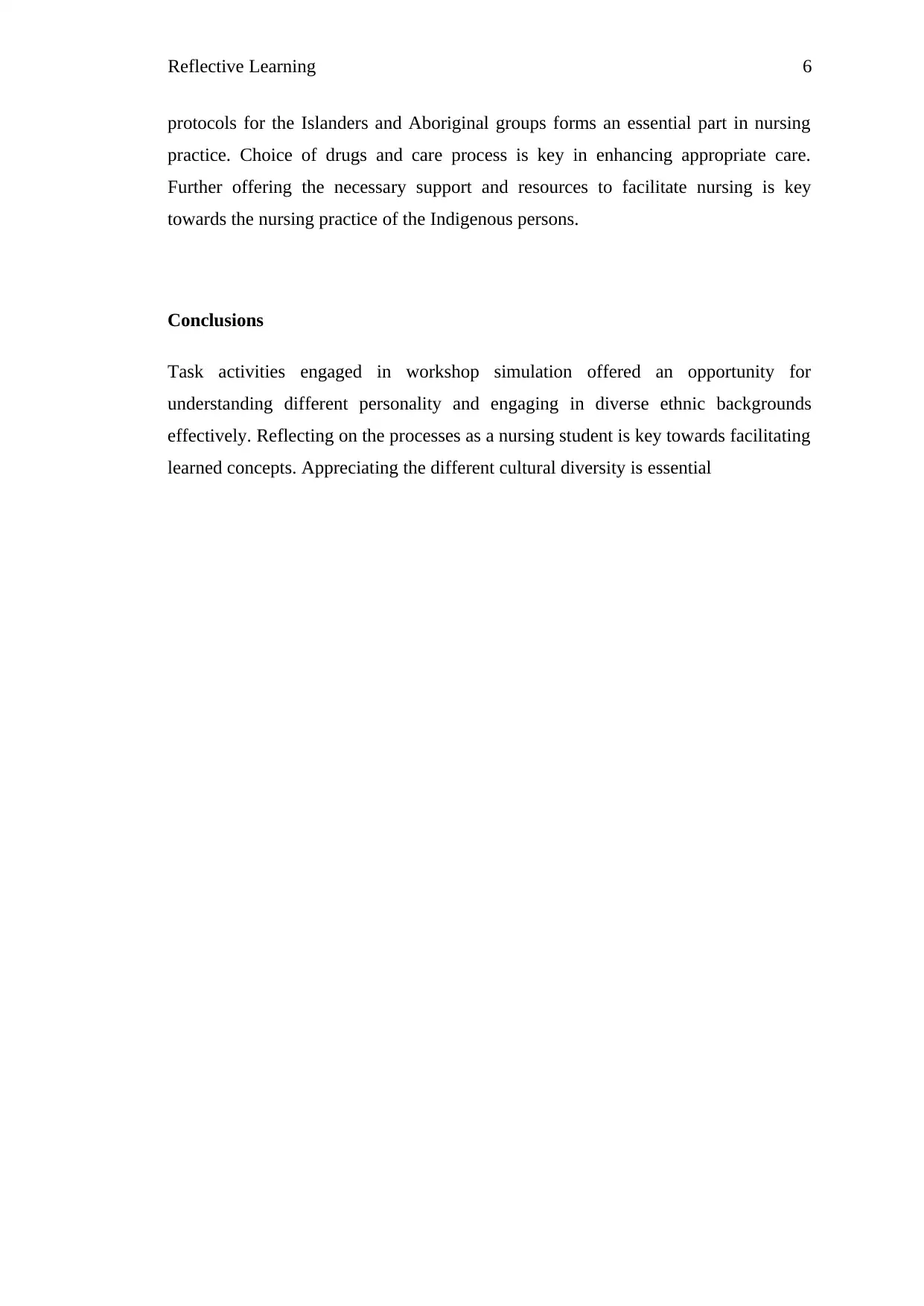
Reflective Learning 6
protocols for the Islanders and Aboriginal groups forms an essential part in nursing
practice. Choice of drugs and care process is key in enhancing appropriate care.
Further offering the necessary support and resources to facilitate nursing is key
towards the nursing practice of the Indigenous persons.
Conclusions
Task activities engaged in workshop simulation offered an opportunity for
understanding different personality and engaging in diverse ethnic backgrounds
effectively. Reflecting on the processes as a nursing student is key towards facilitating
learned concepts. Appreciating the different cultural diversity is essential
protocols for the Islanders and Aboriginal groups forms an essential part in nursing
practice. Choice of drugs and care process is key in enhancing appropriate care.
Further offering the necessary support and resources to facilitate nursing is key
towards the nursing practice of the Indigenous persons.
Conclusions
Task activities engaged in workshop simulation offered an opportunity for
understanding different personality and engaging in diverse ethnic backgrounds
effectively. Reflecting on the processes as a nursing student is key towards facilitating
learned concepts. Appreciating the different cultural diversity is essential
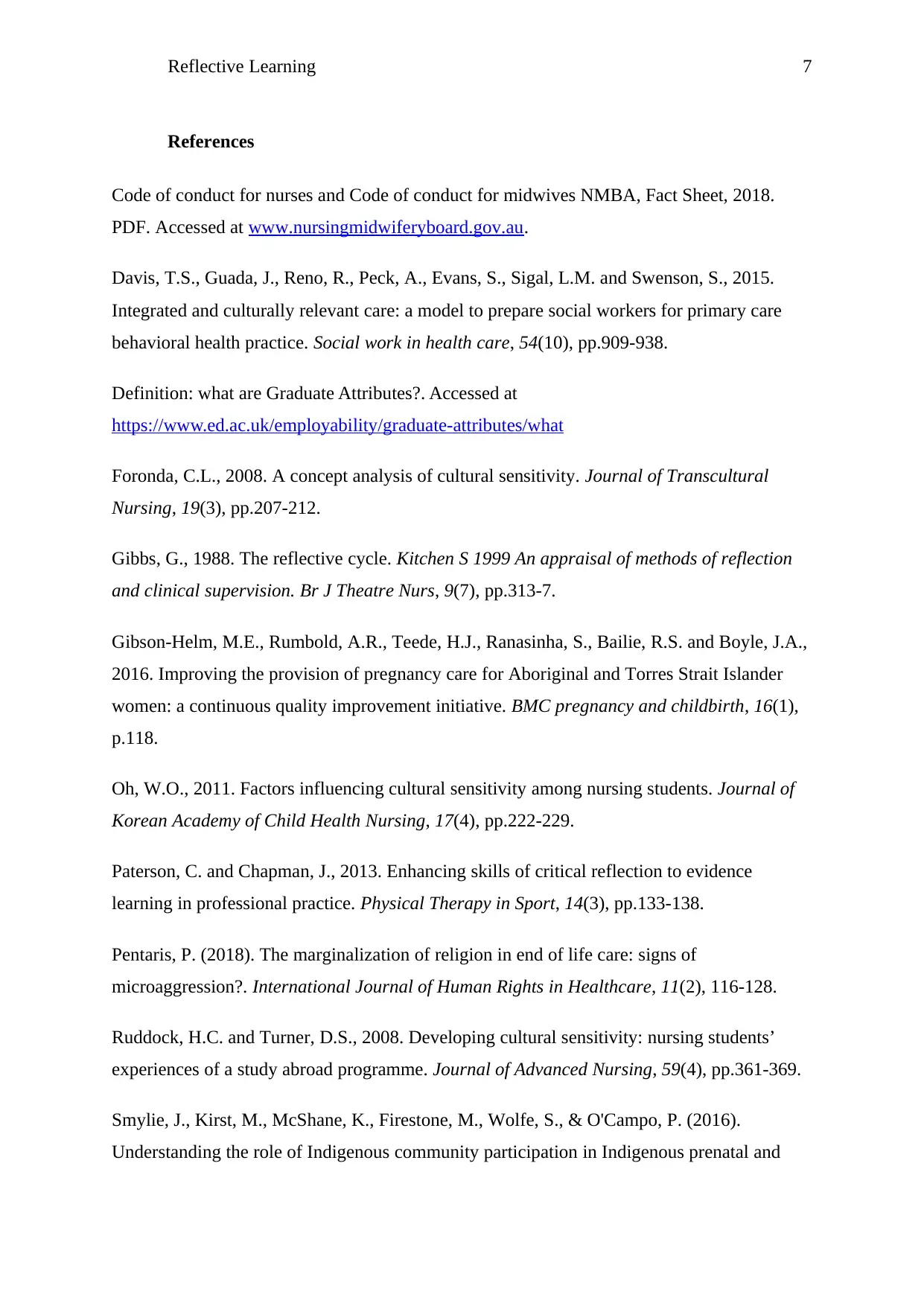
Reflective Learning 7
References
Code of conduct for nurses and Code of conduct for midwives NMBA, Fact Sheet, 2018.
PDF. Accessed at www.nursingmidwiferyboard.gov.au.
Davis, T.S., Guada, J., Reno, R., Peck, A., Evans, S., Sigal, L.M. and Swenson, S., 2015.
Integrated and culturally relevant care: a model to prepare social workers for primary care
behavioral health practice. Social work in health care, 54(10), pp.909-938.
Definition: what are Graduate Attributes?. Accessed at
https://www.ed.ac.uk/employability/graduate-attributes/what
Foronda, C.L., 2008. A concept analysis of cultural sensitivity. Journal of Transcultural
Nursing, 19(3), pp.207-212.
Gibbs, G., 1988. The reflective cycle. Kitchen S 1999 An appraisal of methods of reflection
and clinical supervision. Br J Theatre Nurs, 9(7), pp.313-7.
Gibson-Helm, M.E., Rumbold, A.R., Teede, H.J., Ranasinha, S., Bailie, R.S. and Boyle, J.A.,
2016. Improving the provision of pregnancy care for Aboriginal and Torres Strait Islander
women: a continuous quality improvement initiative. BMC pregnancy and childbirth, 16(1),
p.118.
Oh, W.O., 2011. Factors influencing cultural sensitivity among nursing students. Journal of
Korean Academy of Child Health Nursing, 17(4), pp.222-229.
Paterson, C. and Chapman, J., 2013. Enhancing skills of critical reflection to evidence
learning in professional practice. Physical Therapy in Sport, 14(3), pp.133-138.
Pentaris, P. (2018). The marginalization of religion in end of life care: signs of
microaggression?. International Journal of Human Rights in Healthcare, 11(2), 116-128.
Ruddock, H.C. and Turner, D.S., 2008. Developing cultural sensitivity: nursing students’
experiences of a study abroad programme. Journal of Advanced Nursing, 59(4), pp.361-369.
Smylie, J., Kirst, M., McShane, K., Firestone, M., Wolfe, S., & O'Campo, P. (2016).
Understanding the role of Indigenous community participation in Indigenous prenatal and
References
Code of conduct for nurses and Code of conduct for midwives NMBA, Fact Sheet, 2018.
PDF. Accessed at www.nursingmidwiferyboard.gov.au.
Davis, T.S., Guada, J., Reno, R., Peck, A., Evans, S., Sigal, L.M. and Swenson, S., 2015.
Integrated and culturally relevant care: a model to prepare social workers for primary care
behavioral health practice. Social work in health care, 54(10), pp.909-938.
Definition: what are Graduate Attributes?. Accessed at
https://www.ed.ac.uk/employability/graduate-attributes/what
Foronda, C.L., 2008. A concept analysis of cultural sensitivity. Journal of Transcultural
Nursing, 19(3), pp.207-212.
Gibbs, G., 1988. The reflective cycle. Kitchen S 1999 An appraisal of methods of reflection
and clinical supervision. Br J Theatre Nurs, 9(7), pp.313-7.
Gibson-Helm, M.E., Rumbold, A.R., Teede, H.J., Ranasinha, S., Bailie, R.S. and Boyle, J.A.,
2016. Improving the provision of pregnancy care for Aboriginal and Torres Strait Islander
women: a continuous quality improvement initiative. BMC pregnancy and childbirth, 16(1),
p.118.
Oh, W.O., 2011. Factors influencing cultural sensitivity among nursing students. Journal of
Korean Academy of Child Health Nursing, 17(4), pp.222-229.
Paterson, C. and Chapman, J., 2013. Enhancing skills of critical reflection to evidence
learning in professional practice. Physical Therapy in Sport, 14(3), pp.133-138.
Pentaris, P. (2018). The marginalization of religion in end of life care: signs of
microaggression?. International Journal of Human Rights in Healthcare, 11(2), 116-128.
Ruddock, H.C. and Turner, D.S., 2008. Developing cultural sensitivity: nursing students’
experiences of a study abroad programme. Journal of Advanced Nursing, 59(4), pp.361-369.
Smylie, J., Kirst, M., McShane, K., Firestone, M., Wolfe, S., & O'Campo, P. (2016).
Understanding the role of Indigenous community participation in Indigenous prenatal and
Paraphrase This Document
Need a fresh take? Get an instant paraphrase of this document with our AI Paraphraser
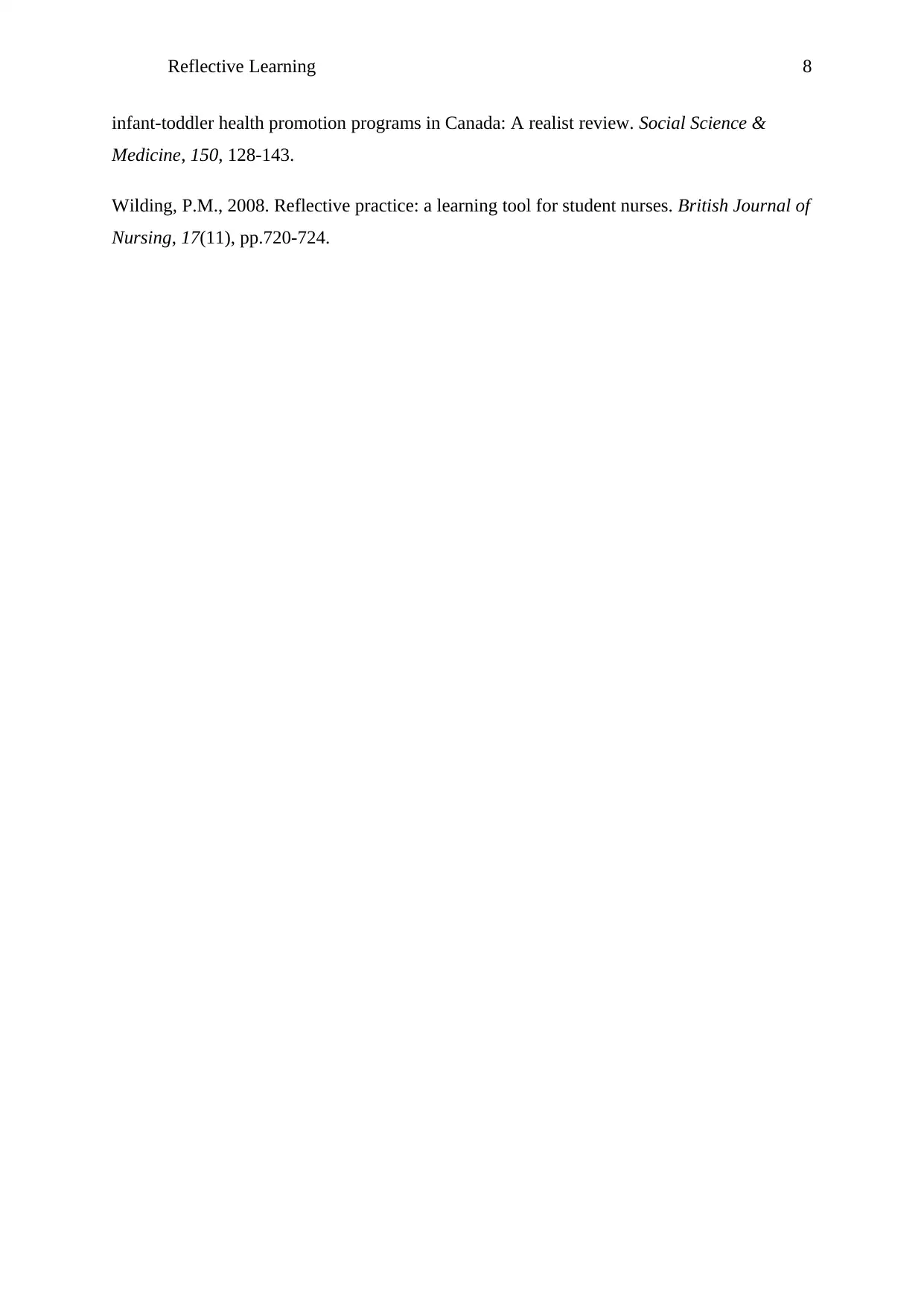
Reflective Learning 8
infant-toddler health promotion programs in Canada: A realist review. Social Science &
Medicine, 150, 128-143.
Wilding, P.M., 2008. Reflective practice: a learning tool for student nurses. British Journal of
Nursing, 17(11), pp.720-724.
infant-toddler health promotion programs in Canada: A realist review. Social Science &
Medicine, 150, 128-143.
Wilding, P.M., 2008. Reflective practice: a learning tool for student nurses. British Journal of
Nursing, 17(11), pp.720-724.
1 out of 8
Related Documents
Your All-in-One AI-Powered Toolkit for Academic Success.
+13062052269
info@desklib.com
Available 24*7 on WhatsApp / Email
![[object Object]](/_next/static/media/star-bottom.7253800d.svg)
Unlock your academic potential
© 2024 | Zucol Services PVT LTD | All rights reserved.




